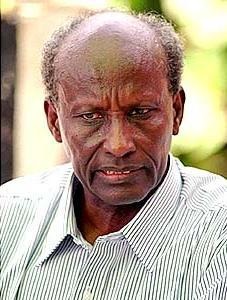Reviewed by Hassan M. Abukar
Book: Somali Phoenix
Author: Jama Mohamed Ghalib
Publisher: Self
Date: January, 2013
Pages: 272
Available: Amazon.com
Jama Mohamed Ghalib “Jama Yare” is a Somali politician and writer. He held important posts in Somalia’s civilian government in the 1960s, and later in Siad Barre’s regime. He was the head of the national police under Barre and served, among other important posts, as interior, labor, local government and transport minister. After 1991, he served as a special adviser to General Mohamed Farah Aideed and later became an active participant in various Somali peace conferences held in Kenya, Ethiopia, Egypt and Djibouti. Jama published his first book, The Cost of Dictatorship, in 1995. The book under review, Somali Phoenix, is his latest.
 This book is a continuation of unfinished business that the author did not address in his first book. It begins with the significance of the Arta Conference which was held in Djibouti in 2000. That important gathering, just 10 years after the beginning of the Somali civil war, was historic—it was the first time a Somali peace conference run by Somalis produced the first transitional government in the country. A Somali government came to existence that was internationally recognized, with a national charter and a clearly defined structure of power: executive, legislative, and judiciary branches. Unfortunately, Arta’s success was not capitalized upon because powerful and sinister forces made sure that it did not succeed. First and foremost, Ethiopia—Somalia’s longtime neighbor and rival— was inimical to the Somali-owned peace conference from the very beginning. Addis Ababa, sensing a rare opportunity to precipitate Somalia’s decline into anarchy, set out to derail the accomplishments of the Arta conference and the transitional national government that it bore. While Ethiopia was the major obstacle, according to Ghalib, other international entities such as the United Nations and the United States, turned a blind eye on Addis Ababa’s negative meddling in Somali affairs. This Ethiopian intervention manifested in several forms, from actual military invasion and periodic incursions in the country to blatant interference —mostly by proxy— in all Somali peace conferences. In one instance during the early 1990s, Somalia’s factions, which were 16, were invited to a gathering in Addis Ababa. Soon, that number had multiplied into 25 separate groups. Some of the Somali personalities who had been invited were mere figures without actual groups. Ethiopia, according to Ghalib, has always had an expansionist policy toward Somalia, a policy that is several hundred years old and is also deeply rooted in fear of Islam.
This book is a continuation of unfinished business that the author did not address in his first book. It begins with the significance of the Arta Conference which was held in Djibouti in 2000. That important gathering, just 10 years after the beginning of the Somali civil war, was historic—it was the first time a Somali peace conference run by Somalis produced the first transitional government in the country. A Somali government came to existence that was internationally recognized, with a national charter and a clearly defined structure of power: executive, legislative, and judiciary branches. Unfortunately, Arta’s success was not capitalized upon because powerful and sinister forces made sure that it did not succeed. First and foremost, Ethiopia—Somalia’s longtime neighbor and rival— was inimical to the Somali-owned peace conference from the very beginning. Addis Ababa, sensing a rare opportunity to precipitate Somalia’s decline into anarchy, set out to derail the accomplishments of the Arta conference and the transitional national government that it bore. While Ethiopia was the major obstacle, according to Ghalib, other international entities such as the United Nations and the United States, turned a blind eye on Addis Ababa’s negative meddling in Somali affairs. This Ethiopian intervention manifested in several forms, from actual military invasion and periodic incursions in the country to blatant interference —mostly by proxy— in all Somali peace conferences. In one instance during the early 1990s, Somalia’s factions, which were 16, were invited to a gathering in Addis Ababa. Soon, that number had multiplied into 25 separate groups. Some of the Somali personalities who had been invited were mere figures without actual groups. Ethiopia, according to Ghalib, has always had an expansionist policy toward Somalia, a policy that is several hundred years old and is also deeply rooted in fear of Islam.
Ghalib devotes more than 98 pages (one-third) of the book to the destabilizing role of Ethiopia in the past and present of Somalia. What follows is an interesting discussion of other countries’ policies toward Somalia. For instance, Ghalib has a positive view of countries and entities like Kenya, Djibouti, Italy, Egypt, OAU, and the Arab League. The book also covers some general features of Somali culture, Somaliland, and certain key personalities in Somalia.
The discussion on Somaliland and how its secessionist government was founded is perhaps one of the most interesting parts of the book. Ghalib, an avowed nationalist and unionist, minces no words and provides detailed historical and legal refutations of claims made by Somaliland politicians as to why they opted for secession from Somalia.
Perhaps, the discussion of some Somali political leaders, as seen by Ghalib, will create uproar. Ghalib talks about personalities such as Dr. Ismail Jumale Ossoble, Hashi Weheliye Maalin, Ali Mahdi, Aideed, Abdulkadir Zoppo, Abdullahi Yusuf, Mohamed Abshir, Abdirahman Tuur, and Mohamed Ibrahim Egal. The author’s view of the Aideed is generally positive. Ghalib, for instance, spends less than a paragraph discussing the clan cleansing that took place in southern Somalia. Ghalib’s four-sentence recap of that tragedy in Mogadishu in which thousands of innocent civilians were killed, uprooted, and targeted simply because of their clan affiliation, is as follows:
 “Aideed led an uprising against a formidable and strongly established order. The victory over the latter, unfortunately, degenerated into a tragic civil war and inter-clan strafes to which Aideed’s militia was also a party. People therefore died on all sides throughout these conflicts, whether combatants or innocents. Many personalities including Aideed could not therefore escape responsibility for the upheavals per se, but he was never personally accused, let alone proved, of any particular willful murder of non-combatant civilians.”
“Aideed led an uprising against a formidable and strongly established order. The victory over the latter, unfortunately, degenerated into a tragic civil war and inter-clan strafes to which Aideed’s militia was also a party. People therefore died on all sides throughout these conflicts, whether combatants or innocents. Many personalities including Aideed could not therefore escape responsibility for the upheavals per se, but he was never personally accused, let alone proved, of any particular willful murder of non-combatant civilians.”
Ghalib’s narrative of the late former prime minister of Somalia, Egal, is the most intriguing. The discussion is exhaustive and multi-faceted. It covers Egal’s family history, his failure to finish college in England, his political career which was replete with brilliance and backstabbing, public service and corruption, relations with the CIA—real or imagined—and years of imprisonment in Barre’s jails, serving as lackey to Barre after his release and betraying his people in the north, and finally changing colors and expediently becoming a secessionist leader and president of Somaliland. What piques the interest of the reader is what Egal did to Ghalib while the former was in power in Somaliland. Egal sent assassins to Ghalib’s house in Hargeisa, who in turn showered the author and his family with a fusillade of bullets. Fortunately, no one was hurt. Ghalib has reproduced in his book a hand-written letter allegedly written by Egal ordering the political assassination.
Ghalib’s book is a valuable addition to Somali studies. He is an excellent writer and is well-versed in Somali history, politics and culture. His assessment of political events, though at times clouded by his inherent biases, is powerful. I liked Ghalib’s first book, The Cost of Dictatorship, and feel the same with his new book. Ghalib is a Somali icon whose integrity and love of Somalia cannot be disputed. He stands tall in a world where many Somali politicians have sold their country to the highest bidder. Some consider Ghalib as a politician who, despite having served under Barre for 14 years as head of the police and interior minister, has not taken any responsibility for the crimes of that repressive regime. This is a subject Ghalib has yet to address because he has skillfully eschewed it in his prolific writings about Somalia.
Because this book is self-published, Ghalib, unlike his first book, lacked the services of a professional editor. Hence, the book is poorly edited. It is inundated with numerous references—some good and some unimportant—that should have been neatly organized in footnotes. Despite that shortcoming, I would highly recommend this book to serious readers who are interested in Somali history and politics and who want to know why Somalia is in the state that it is in today.
Hassan M. Abukar
Email:[email protected]
—————-
Hassan M. Abukar is a freelance writer and political analyst.
We welcome the submission of all articles for possible publication on WardheerNews.com. WardheerNews will only consider articles sent exclusively. Please email your article today . Opinions expressed in this article are those of the author and do not necessarily reflect the views of WardheerNews.
WardheerNew’s tolerance platform is engaging with diversity of opinion, political ideology and self-expression. Tolerance is a necessary ingredient for creativity and civility.Tolerance fuels tenacity and audacity.
WardheerNews waxay tixgelin gaara siinaysaa maqaaladaha sida gaarka ah loogu soo diro ee aan lagu daabicin goobo kale. Maqaalkani wuxuu ka turjumayaa aragtida Qoraaga loomana fasiran karo tan WardheerNews.
Copyright © 2024 WardheerNews, All rights reserved


